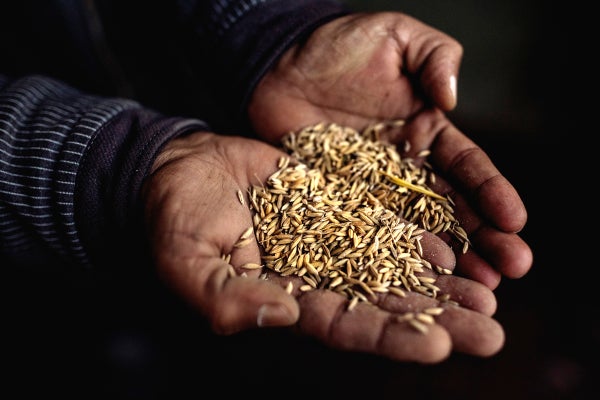The election of Joe Biden and Kamala Harris as president-elect and vice president-elect of the United States has been celebrated as a win for the scientific community. In his acceptance speech, Biden expressed that the American people have called on him and Harris as leaders, “to marshal the forces of science and the forces of hope in the great battles of our time.” Climate change and the COVID-19 pandemic have featured heavily in this presidential campaign and are without question two of the great battles we are currently facing that require scientific expertise.
But this mandate to lead with science must extend to all challenges where science is needed, including agriculture. The Biden administration will undoubtedly listen to scientists when it comes to agricultural decision-making. The public that voted in the name of science must do the same.
Agriculture is inextricably linked to many global challenges we are now facing. Our current agriculture system is a major emitter of greenhouse gases (about a quarter of total emissions) while at the same time agriculture is dangerously vulnerable to harmful effects of the climate crisis. Extreme temperatures, floods, droughts and pest migrations are all examples of harsh environmental conditions exacerbated by climate change that are increasingly threatening crops worldwide. Amidst these pressures, the practice of deforestation to create new swaths of arable land must end in order to preserve biodiversity and maintain valuable carbon sinks.
On supporting science journalism
If you're enjoying this article, consider supporting our award-winning journalism by subscribing. By purchasing a subscription you are helping to ensure the future of impactful stories about the discoveries and ideas shaping our world today.
In order for global agriculture to rapidly become more sustainable and climate resilient, we must have the power to responsibly use every tool at our disposal, including genetic engineering. No single solution is a silver bullet, and successful strategies to improve agricultural sustainability will likely involve a wide range of practices used together; experts have been clear about the need to combine low-tech and high-tech approaches for years. Current research in plant biotechnology focuses on developing plant traits related to climate resilience and sustainability such as drought tolerance, disease resistance and capturing carbon from the atmosphere. How and when different methods need to be used is for experts to decide, but the public must be open to biotechnology as a part of sustainable solutions.
For too long the rhetoric on genetic engineering in agriculture has been polarized, and reasoning has been clouded by emotion instead of based on evidence. There is fault on both sides for the existing antagonism. Immensely successful marketing strategies have been based on inciting fear and distributing false information. Large corporations have sewn mistrust. Promises were made that were never realized. But in 2020, the “GMO vs. organic” debate is outdated and unproductive.
Plant genetics research and development today has advanced far beyond the early GMOs of the 1990s. New technologies are redefining and revolutionizing genetic engineering in ways that couldn’t have been imagined even only 10 years ago. Innovations will continue to emerge that do not fit old categories and old assumptions. Meanwhile, modern large-scale organic agriculture has far more in common with conventional industrial practices than the quaint farm pictured on the grocery store packaging suggests. Entrenched and misleading narratives on both GMO and organic production methods must be dismantled; the divisive rhetoric hinders progress that is urgently needed in order to create a more sustainable future.
The vast majority of the scientific community agrees on the safety and potential of genetically engineered crops. Over 150 Nobel Laureates signed an open letter supporting genetically engineered crops in 2016 that stated, “Opposition based on emotion and dogma contradicted by data must be stopped.” The American public cannot have selective hearing when we say we will listen to scientists. We need to fight for the facts on genetic engineering and for the validity of the experts in this field the same way we fight for data and truth on climate change. We need to come together to focus on evidence to make decisions instead of letting old emotional battles divide us and block solutions.
President-elect Biden made a plea to a highly divided American people in his acceptance speech, “It’s time to put away the harsh rhetoric. To lower the temperature. To see each other again. To listen to each other again. To make progress, we must stop treating our opponents as our enemy.” The same message applies to the established factions in this nation regarding the use of genetic engineering in agriculture. The stakes are too high to let the antagonism continue any longer. We need to act in the manner in which we voted—supportive of science and hopeful for a more sustainable and unified future.
